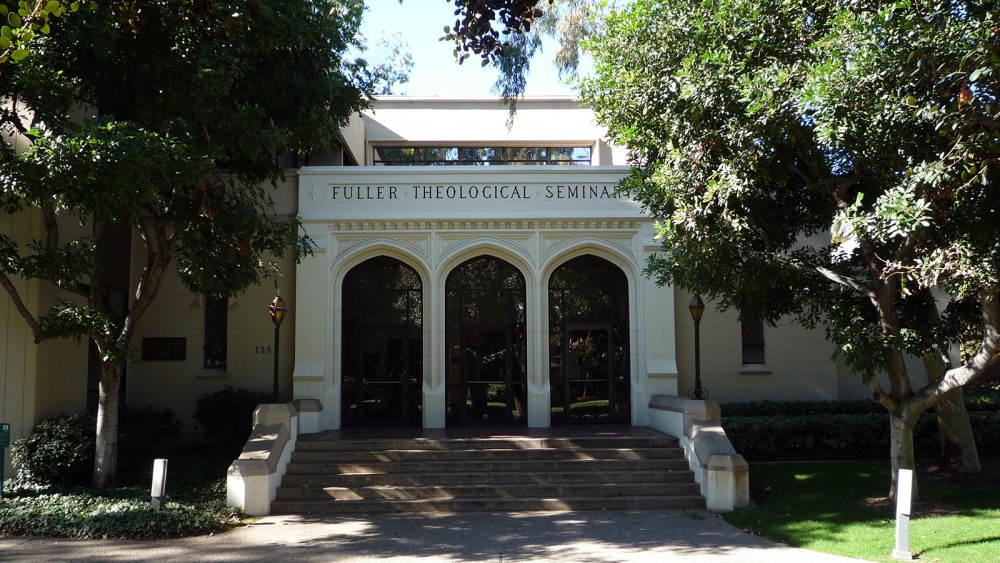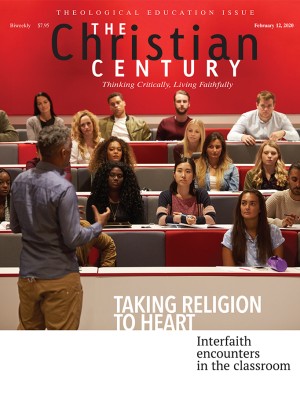LGBTQ student joins suit against seminary

For Nathan Brittsan, it was his own “mini dark night of the soul.” Days into his first quarter as a student at Fuller Theological Seminary, Brittsan was expelled.
He spent another six months “in limbo,” he said, trying to appeal the school’s decision.
An associate pastor at Grace Baptist Church in San Jose, part of the American Baptist Churches USA, he needed to earn his MDiv on his way to ordination. He felt called to attend Fuller, an evangelical, multidenominational graduate school in Pasadena, California.
He never hid his sexual orientation or the fact that he belonged to an LGBTQ-affirming church, he said. He knew others who attended the school who were gay or affirming. He knew the school allowed an LGBTQ student group on campus.
So he was surprised to receive the letter of dismissal from the school—all because officials learned he was married to another man.
Brittsan is the second graduate student expelled from Fuller over a same-sex marriage to join a lawsuit against the seminary. Joanna Maxon, who was expelled from the seminary in October 2018 as she neared the end of her studies, brought a lawsuit against Fuller in November.
Read our latest issue or browse back issues.
Maxon had married her wife in 2016 after the legalization of same-sex marriage, according to the suit. They filed a joint tax return, and Maxon authorized the IRS to share her tax filing with Fuller for financial aid purposes.
When the Office of Student Financial Services received her tax return, it submitted a complaint stating that she had violated the sexual standards statement in the school’s community standards.
In an amended complaint filed in January, Brittsan and Maxon allege Fuller Theological Seminary violated antidiscrimination laws when it expelled them after learning they were married to people of the same sex.
The outcome of the suit could significantly impact how faith-based institutions across the country apply Title IX protections to LGBTQ students in same-sex marriages. Title IX prohibits sex discrimination in federally funded education programs or activities.
Brittsan’s dismissal letter also said he had violated the seminary’s community standards, which reserve sex for marriage, defined as a “covenant union between one man and one woman.”
But those standards don’t “prohibit same-sex dating relationships or same-sex civil marriages,” according to the lawsuit. And neither Brittsan nor Maxon were asked whether they had engaged in the “homosexual forms of explicit sexual conduct” the standards do prohibit, it said.
The lawsuit also raises issues of privacy, said Paul Southwick, the attorney representing Brittsan and Maxon.
“There are student privacy issues because now that more and more same-sex marriages are occurring, particularly if they are people of faith who would like to attend a faith-based institution, they may have no idea that by submitting their FAFSA form, they are essentially putting themselves in jeopardy for expulsion or admission,” he said.
Their lawsuit, he said, is not about taking down religious liberty. “It’s recognizing that religious liberty comes with responsibility and the responsibility to do no harm to other people.”
The Becket Fund for Religious Liberty, a nonprofit based in Washington, D.C., is representing Fuller.
Becket defends religious liberty issues including such high-profile cases as the Supreme Court case Burwell v. Hobby Lobby and the recent United States of America v. Scott Warren.
The Fuller case is a “very important case,” said Daniel Blomberg, senior counsel for Becket, because it could affect many faith groups.
“It’s really about whether or not religious groups get to define what it means to be a member of that particular religious community or whether you can use government power to force religious groups to change their minds and change their beliefs,” he said.
Additionally, Blomberg said all students attending Fuller sign the community standards.
But Trista Eazell, a student at Fuller and pastoral intern at an LGBTQ-affirming church, said it’s scary the way the school chooses when and how to apply those guidelines.
Many students go against the seminary’s sexual standards statement and don’t get disciplined. However, she said, “it seems like if you are gay, that’s a different story.”
Eazell, who identifies as heterosexual, started an online petition titled “End Discrimination of LGBTQ+ Students at Fuller Theological Seminary” that has gotten more than 1,200 signatures.
She also is organizing protests and other gatherings to shed light on discrimination at Fuller with the help of Brave Commons—a nonprofit that advocates for LGBTQ students in Christian universities—and other students at Fuller, she said.
Eazell said they aim to show that Fuller’s community standards “do not reflect the student body, the community around the school and the Christian community in general.”
Meanwhile, Brittsan is continuing his studies at the American Baptist Seminary of the West—but his experience at Fuller has put him a year behind.
It also left him with a sense of disillusionment. “It was difficult to approach this situation in a positive way because it was so disappointing that a Christian institution had treated me this way,” Brittsan said.
And he hopes the lawsuit he’s brought with Maxon means it won’t happen to anyone else.
“As much as I did not want to put myself in the public spotlight,” he said, “I thought it was very important to make sure this kind of situation didn’t happen to anyone else again, because I wouldn’t wish this situation on anyone else.” —Religion News Service






